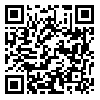Volume 5, Issue 14 (spring & summer- 2010)
2010, 5(14): 95-134 |
Back to browse issues page
Download citation:
BibTeX | RIS | EndNote | Medlars | ProCite | Reference Manager | RefWorks
Send citation to:



BibTeX | RIS | EndNote | Medlars | ProCite | Reference Manager | RefWorks
Send citation to:
Shiri G. Political ambiguity in Nezami’s poetry. Journal title 2010; 5 (14) :95-134
URL: http://jls.khu.ac.ir/article-1-827-en.html
URL: http://jls.khu.ac.ir/article-1-827-en.html
Razi University , ghahreman_shiri@yahoo.com
Abstract: (13601 Views)
If we claim that the main subject in Nezami’s life and collection of poems is that of the politics – of course except for Leili and Majnoun- our claim is not off the track. However, in order to prove the dominance of politics in Nezamy’s poems and consequently in his life time , one needs to provide documentation and persuasive reasoning in all poems collections. Nezamy offers his positions either ironically and generally or by appealing to historical samples and figurative speech so as to protect his secluded life from the political turmoil. Makhzanollasrar depicts political and social "shoulds" and "shouldn’ts" in a moral- religious context. Khosro and Shirin is a sample of "should" and "shouldn’ts" in emotional- political behaviors and Haft Peikar (seven figures) and Eskandar Nameh are also considered as ideal values in the field of simple political actions and reactions. Despite all differences, these poetic collections are common in one subject. That is, depicting ideals and human goals in all places and times. Initially, the poet discusses about a moral and ideological society or religious utopia. Then he depicts the emotional and romance modes as well as desirable and undesirable human's reactions against these modes. Then he deals with political society and its desired characters, narrating about his political utopia of two different forms- in the form of existence relativity in country history or in the form of a desirable reality in the world history. This helps Nezamy to show his discontent with status quo through taking refuge in aliens.
Keywords: Nezami’s, Khamseh Political ambiguous, Political utopia, Haft Peikar (seven Figures), Eskandar Nameh
Type of Study: Research |
References
1. احمدنژاد، کامل (1375) تحلیل آثار نظامی گنجوی. چاپ دوم. تهران: پایا.
2. امامی، نصرالله (1372) «گنجه، زادگاه نظامی». مجموعه مقالات کنگره بینالمللی بزرگداشت نهمین سده تولّد حکیم نظامی گنجوی. به اهتمام و ویرایش منصور ثروت. 3 جلد. تبریز دانشگاه تبریز.
3. خاقانی، افضلالدّین بدیل بن علی نجّار (1374) دیوان خاقانی. چاپ پنجم. تهران: زوّار.
4. پناهی سمنانی، محمّد احمد (1372) «مروری در آرمانشهر نظامی گنجوی». مجموعه مقالات کنگره بینالمللی بزرگداشت نهمین سده تولّد حکیم نظامی گنجوی. به اهتمام و ویرایش منصور ثروت. 3 جلد. تبریز دانشگاه تبریز.
5. ذوالفقاری، حسن (1385) «هفت پیکر نظامی و نظیرههای آن»: مجله دانشکده ادبیات و علوم انسانی دانشگاه تربیت معلّم. سال 14. شماره 52 و 53.
6. زرّینکوب، عبدالحسین (1369) «نظامی گنجوی: در جستجوی ناکجا آباد». با کاروان اندیشه. تهران: چاپ دوم. امیرکبیر.
7. زرّینکوب، عبدالحسین(1370) با کاروان حلّه. چاپ ششم. تهران: علمی.
8. زرّینکوب، عبدالحسین(1377) پیر گنجه در جستجوی ناکجا آباد. چاپ سوم. تهران: سخن.
9. ریاحی، لیلی (1358) قهرمانان خسرو و شیرین. تهران: امیرکبیر.
10. ریپکا، یان (1364) ادبیات ایران در زمان سلجوقیان و مغولان. ترجمه یعقوب آژند. تهران: گستره.
11. سعدی، مصلحالدین (1372) دیوان غزلیات. تصحیح خلیل خطیب رهبر. چاپ ششم. تهران: مهتاب.
12. سیدحسینی، رضا (1371) مکتبهای ادبی. جلد2. تهران: نگاه.
13. صفا، ذبیحالله (2536) [1356] تاریخ ادبیات در ایران. جلد 2. چاپ پنجم. تهران: امیرکبیر.
14. معین، محمّد (1338) تحلیل هفتپیکر. تهران: دانشگاه تهران.
15. نظامی، الیاسالدین (1363) خسرو و شیرین. به تصحیح و تحشیه حسن وحید دستگردی. چاپ دوم. تهران علمی.
16. نظامی، الیاسالدین (1363) هفتپیکر. به تصحیح و تحشیه حسن وحید دستگردی. چاپ دوم. تهران: علمی.
17. نظامی، الیاسالدین (1363) لیلی و مجنون. به تصحیح و تحشیه حسن وحید دستگردی. چاپ دوم. تهران: علمی.
18. نظامی، الیاسالدین (1363) شرفنامه. به تصحیح و تحشیه حسن وحید دستگردی. چاپ دوم. تهران: علمی.
Send email to the article author
| Rights and permissions | |
 | This work is licensed under a Creative Commons Attribution-NonCommercial 4.0 International License. |







